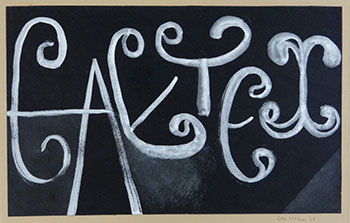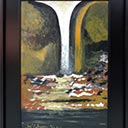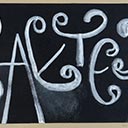Caltex, 1965
24.7 x 39.8 cm
Colin McCahon database, record number cm001093
Caltex forms part of a series of 8 drawings that Colin McCahon made as preparatory designs for an unrealized mural intended for the Caltex Oil Offices in Auckland
McCahon considered painting to be a form of direct communication, which is evident here in his combination of form as visual language, and as direct, written language. At this stage in his career, posters and signage had proved to be highly influential forms for McCahon, making him a perfect candidate for the Caltex mural. By combining visual and verbal elements, McCahon had begun to ask the viewer to consider his works both in a literary sense and for their visual effectiveness, pushing the possibilities of the meaning of written words into the structure of the work. Hamish Keith notes, the written paintings are McCahon's most complex and controversial works, and they provide an insight into his originality and his achievement as a painter p. 131 Colin McCahon: Artist, Gordon H. Brown, A. H. & A. W. Reed Ltd, 1984
In Caltex, McCahon draws upon the Maori motif of the koru, which is simultaneously letter and arrow, grabbing and directing attention. This is thought to be the first time that McCahon utilized the koru in this way. While in some of his works McCahon's use of text shouts loudly out to the viewer, such as in Tuhoe are the People (a poster for Urewera), 1975, the Caltex series refers back to the cubist-inspired forms of the Titirangi period and as a result these works have an elegance and refinement not often apparent in the pure writing paintings





